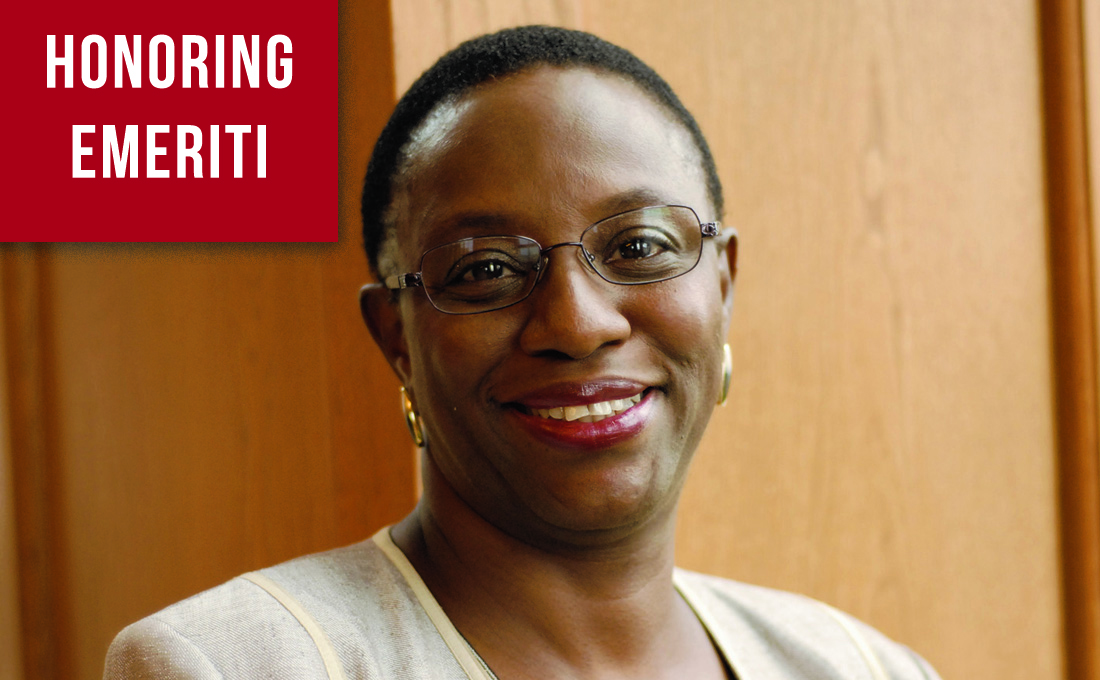Professor Winnie Taylor: Championing the Law’s Role in Providing Equal Opportunity

By Nanette Maxim
At the end of the Spring 2023 semester, three of Brooklyn Law School’s respected professors —Beryl Jones-Woodin, Larry Solan, and Winnie Taylor—announced their retirements. As innovators, scholars, teachers, and colleagues, each has made an enormous impact on our Brooklyn Law School community. Here, we look at Professor of Law Emerita Winnie Taylor.
For Professor of Law Emerita Winnie Taylor, creating a landscape of equal opportunity has been the cornerstone of her accomplished career, as a lawyer, scholar, teacher, mentor, and adviser to financial and government institutions.
Recognized as a national authority in consumer law, contracts, and credit and employment discrimination, Taylor has shared her vast knowledge with Brooklyn Law students since she joined the faculty in 2008. She also played an integral role at the Dennis J. Block Center for the Study of International Business Law, as an Edward V. Sparer Public Interest Law Fellowship Committee member, and as a faculty adviser for the Black Law Students Association.
“For 15 years, Professor Taylor was a mainstay of our contracts and commercial-law faculty,” said Professor Michael Cahill, who is also the school’s former President and Joseph Crea Dean. “Both inside and outside of the classroom, she was dedicated to promoting the success of all of our students.”
For more than four decades, Taylor has played a part in shaping equal opportunity under the law, serving as a consultant for Fair Lending and Workplace Equity, focusing on equal credit opportunity and equal employment opportunity laws. She is a former member of the Federal Reserve Board’s Consumer Advisory Council and has trained attorneys at the Federal Trade Commission on fair lending and consumer banking issues as well as numerous representatives from the credit union industry.
Taylor has written extensively on the federal Equal Credit Opportunity Act and legal issues related to the subprime mortgage crisis and fair lending compliance issues, especially as they involve race. In her 2021 Loyola Consumer Law Review article, Fintech and Race-Based Inequality in the Home Mortgage and Auto Financing Markets, she cited the findings of a University of California, Berkeley study that she said “show that fintech and traditional lenders charged otherwise equal Latinx and African American borrowers higher interest rates than White borrowers for purchase and refinanced mortgages, costing the minority borrowers $765 million yearly, for the same product… The worry is that as fintech firms continue to grow and eventually overtake the financial services industry, the racial wealth gap will become even wider given that home ownership is the primary source of wealth for most Americans.”
After her early years practicing as an attorney at Rochester, N.Y., firm Harris, Beach, Wilcox, Rubin & Levey, Taylor began her teaching career at the University of Florida’s Levin College of Law. In 1990, she joined the faculty of the Cornell University School of Law, where she was the first woman to of color to receive tenure, and where she is now professor emeritus. As Cornell’s associate provost, she was responsible for creating and shaping university policy as it relates to faculty development and enhancement, diversity issues, academic programs, regulatory compliance, and recruiting. (Although retired from Brooklyn Law School, Taylor continues to teach at Cornell.)
Taylor also focused on international projects. She journeyed to Rwanda, beginning in 2006, where she worked with fellow professors on that country’s common law reform project, helping to draft a new code of contract law and training commercial court judges on the proposed reforms. In 2010, the Rwandan legislature adopted a modified version of the proposed common law code of contract law.
Ultimately, for Taylor, the pursuit of equity under the law has been both a professional and personal one. As she once said, in her address to the 1992 graduating class at the Cornell School of Law, “I am acutely aware of the fact that law has shaped my life. A law was passed to give me the right to vote. A law was passed to give me equal employment opportunity, and … on May 17, 1954, the United States Supreme Court decided Brown v. Board of Education, a decision that gave me the right to equal educational opportunity. Were it not for that decision, history would be altered, and I would not be your speaker today. … So, I take the law and lawyers very seriously. I have always counted on the technical skill and moral vision of lawyers to make us better people and the commitment of lawyers to the attainment of fairness and equality of opportunity to make this world a better place.”